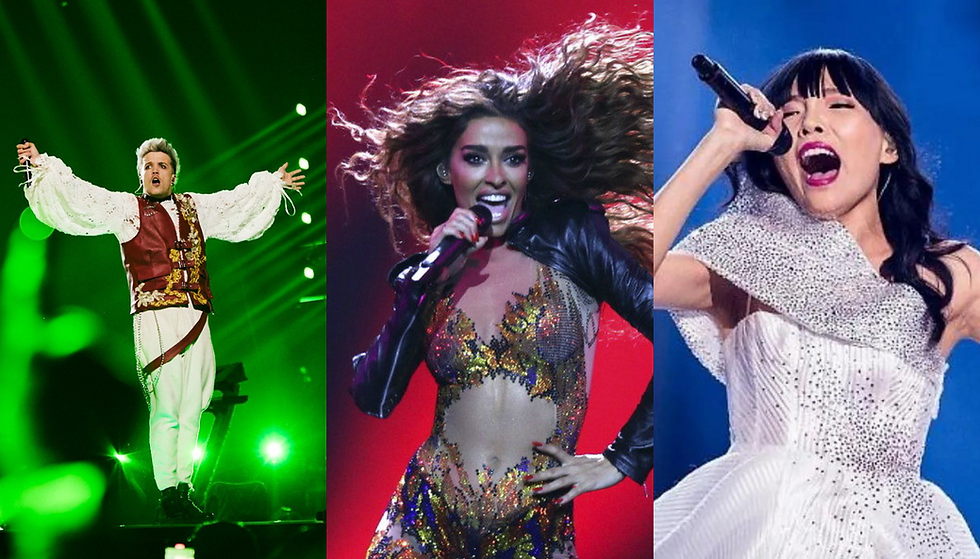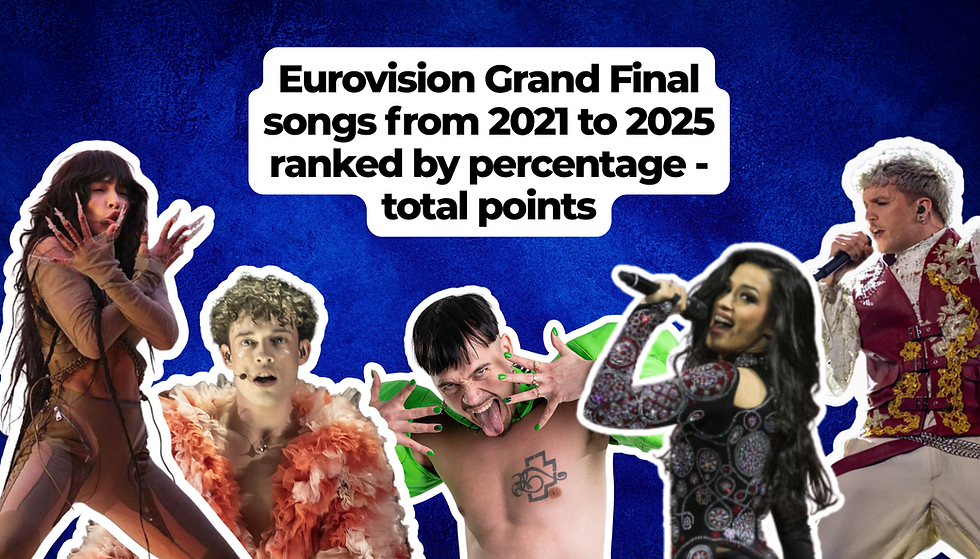Eurovision 2023: The songs by numbers
- Dale Roberts

- Mar 26, 2023
- 2 min read

Now we have all 37 songs for the Eurovision Song Contest 2023, it's a great opportunity to dive into some statistical analysis of the entries.
We've had a look at how the Liverpool acts stack up in terms of total entries, type of acts, language and song titles compared to previous years.
Let's take a look at the results:
Total entries

This year sees Eurovision numbers fall to the lowest since 2014 with just 37 nations taking part.
This is a drop from 40 in 2022 after Bulgaria, North Macedonia and Montenegro chose not to return this year.
This also follows the expulsion of Russia and Belarus in 2021 and 2020 respectively.
Artists

As most years, there is a good mix of the types of acts with female solos leading the way (13), with male solos and groups next (both 10), and duos bringing up the rear (4).

Female soloists lead over male soloists again. Only once in the previous nine years have men been more prevalent than women (in 2019, which was won by Duncan Laurence).
There has, however, been a steady decline in nations sending solo acts to Eurovision.

Meanwhile, the rise of groups competing continues.
Following Måneskin's win in 2021 there was a significant jump that has only dropped slightly from 11 acts to 10 this year.
Rock groups have been a theme of 2023 with six acts representing different aspects of the genre, including Australia's very own Voyager.
Languages other than English

The "Salvador Sobral effect" continues with every year since his win having double digit entries being in languages other than English.
And, in fact, three of the last five winners of Eurovision have not been in English.
For this year's 10 we have only counted songs with more than 50% of their lyrics not in English. Both Romania and Serbia fall *just* under this, so if they were included it would be 12 entries.
Is it too late for 'love'?

As the famous interval act of 2016 'Love, love, peace, peace' says, "the song is essential. Let it be about something everyone can connect to. Love works!"
Well it seems, not so much in recent times!
For the second straight year there is no song with the word 'love' in it. However, Armenia's song is called 'Future Lover' so it is *very* close to counting.
So, as always, Eurovision is a spectacle of race, gender, language and lyrics that brings a totally different set of experiences and statistical talking points every year.
Will the numbers bring us something new this year? A first win for a nation? The first duo to win since 2011? Our first double winner since Johnny Logan? We'll have to wait until May to find out!
For continued updates on all Eurovision Song Contest news, follow us on Facebook, Twitter, TikTok, YouTube and Instagram. All the links can be found at: https://linktr.ee/aussievisionnet



google 优化…
무료카지노 무료카지노;
Fortune Tiger…
Fortune Tiger…
Fortune Tiger…
Fortune Tiger…
gamesimes gamesimes;
站群/ 站群
03topgame 03topgame
betwin betwin;
777 777;
slots slots;
Fortune Tiger…
谷歌seo优化 谷歌SEO优化+外链发布+权重提升;
google 优化 seo技术+jingcheng-seo.com+秒收录;
Fortune Tiger Fortune Tiger;
Fortune Tiger Fortune Tiger;
Fortune Tiger Fortune Tiger;
Fortune Tiger Slots Fortune…
站群/ 站群
gamesimes gamesimes;
03topgame 03topgame
EPS Machine EPS Cutting…
EPS Machine EPS and…
EPP Machine EPP Shape…
Fortune Tiger Fortune Tiger;
EPS Machine EPS and…
betwin betwin;
777 777;
slots slots;
Fortune Tiger Fortune Tiger;
google seo…
03topgame 03topgame;
gamesimes gamesimes;
Fortune Tiger…
Fortune Tiger…
Fortune Tiger…
EPS Machine…
EPS Machine…
seo seo;
betwin betwin;
777 777;
slots slots;
Fortune Tiger…
seo优化 SEO优化;
bet bet;
google seo…
Fortune Tiger…
Fortune Tiger…
Fortune Tiger…
Android Android
software software
Q&A Q&A
Notícias Notícias
sitemap sitemap;
sitemap sitemap;
谷歌seo推广 游戏出海seo,引流,快排,蜘蛛池租售;
Fortune Tiger Fortune Tiger;
Fortune Tiger Fortune Tiger;
Fortune Tiger Fortune Tiger;
Fortune Tiger Fortune Tiger;
Fortune Tiger Slots Fortune Tiger Slots;